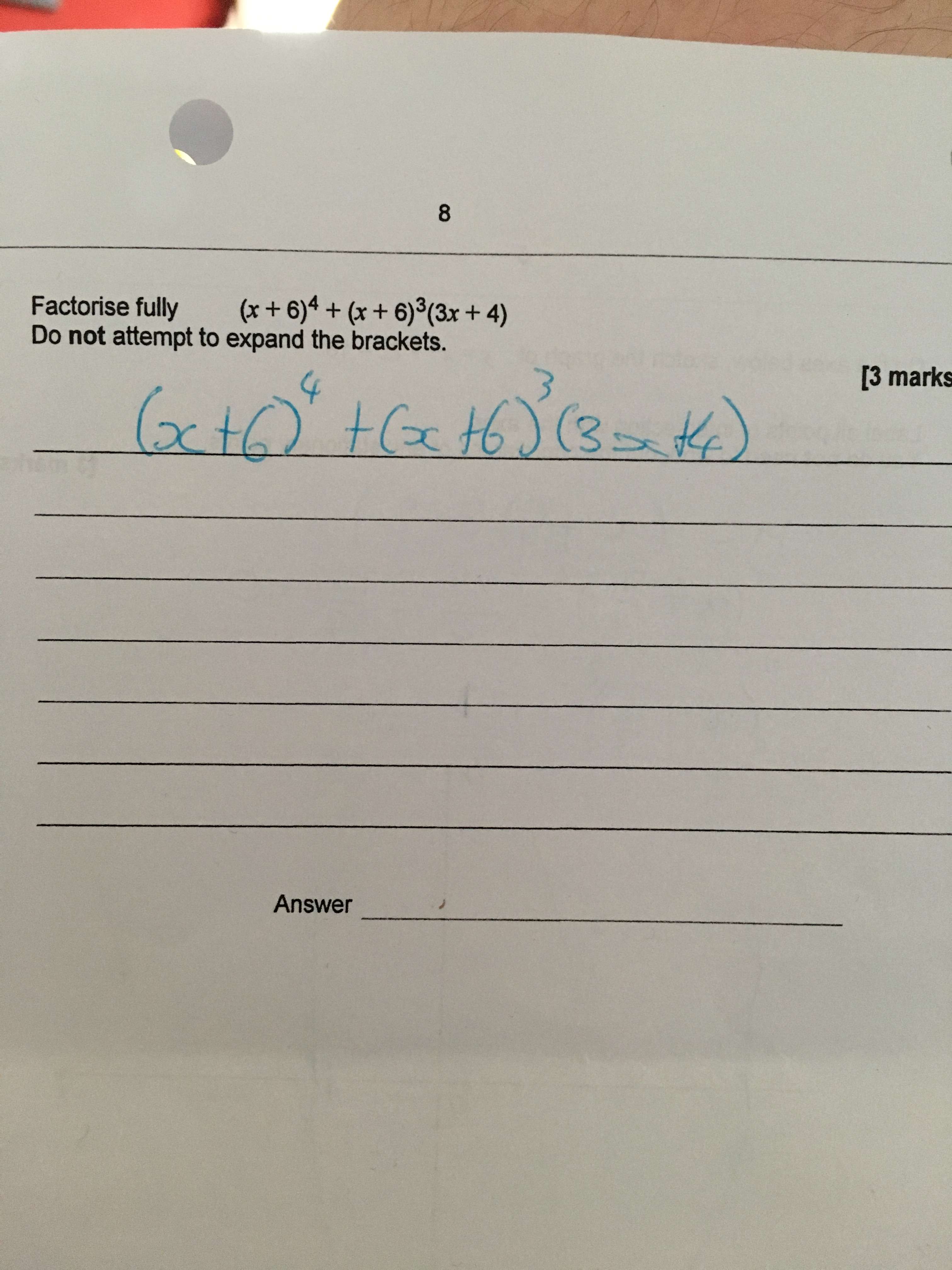Scroll to see replies
Bump
Original post by B_9710
Take out a factor if (x+6)^3 first and then simplify
I don’t know what you mean? :/
Original post by NineOfDiamonds
I don’t know what you mean? :/
Start with a simpler expression:
Can you factorise this? Then think about how this is similar to what you have.
Original post by Notnek
Start with a simpler expression:
Can you factorise this? Then think about how this is similar to what you have.
Can you factorise this? Then think about how this is similar to what you have.
Is it z(y³ + y⁴/z) ?
Original post by NineOfDiamonds
Is it z(y³ + y⁴/z) ?
No the common factor here is so you need to take that outside the brackets.
You need to be confident with this type of factorising before you’ll be able to understand the question in your original post.
Original post by Notnek
No the common factor here is so you need to take that outside the brackets.
You need to be confident with this type of factorising before you’ll be able to understand the question in your original post.
You need to be confident with this type of factorising before you’ll be able to understand the question in your original post.
Oh right I understand
Original post by Notnek
No the common factor here is so you need to take that outside the brackets.
You need to be confident with this type of factorising before you’ll be able to understand the question in your original post.
You need to be confident with this type of factorising before you’ll be able to understand the question in your original post.
Ok so I’ve done,
(x+6)^3 (1(x+6))(3x+4).
Is this right? If so what do I do next?
(edited 6 years ago)
Original post by NineOfDiamonds
Ok so I’ve done,
(x+6)^3 (1(x+6))(3x+4).
Is this right? If so what do I do next?
(x+6)^3 (1(x+6))(3x+4).
Is this right? If so what do I do next?
No, it's not right.
Try the one Notnek posted.
.
What do you get?
Original post by BuryMathsTutor
No, it's not right.
Try the one Notnek posted.
.
What do you get?
Try the one Notnek posted.
.
What do you get?
y^3(y+z)
Original post by NineOfDiamonds
y^3(y+z)
Good. How is this like your original question?
Original post by BuryMathsTutor
Good. How is this like your original question?
Because (x+6)^3 is the highest factor of the first two terms. Why can’t I factorise that out like I did?
Original post by NineOfDiamonds
Because (x+6)^3 is the highest factor of the first two terms. Why can’t I factorise that out like I did?
You forgot the addition sign between (x+6) and (3x+4)
Is this higher tier maths? Or foundation?
Original post by MR1999
You forgot the addition sign between (x+6) and (3x+4)
The addition signs are there?
Original post by Maths_English
Is this higher tier maths? Or foundation?
Higher tier FM
Original post by NineOfDiamonds
The addition signs are there?
In any case, the next step would simply be to add the two terms and then you're done.
Original post by NineOfDiamonds
Higher tier FM
Makes sense, still building up to higher tier algebra at the moment, only just learned factorising and expanding so I tried to do this question with foundation tier knowledge.
Original post by MR1999
In any case, the next step would simply be to add the two terms and then you're done.
Which 2 terms?
Quick Reply
Related discussions
- Factorising quadratics when a isn't 1
- i am so confused (gcse maths)
- MAT question help
- Maths graph help
- Math helpp
- gradient of curves and differentiation
- MAT question
- I think I have done some dodgy algebra (parametrics a level maths)
- Help trig
- Proof by induction question
- Factorising question help
- Maths Problem
- A level Maths question
- Find all real roots
- Algebra help for proof by induction
- Proof question
- Advanced difference of two squares
- Differentation help
- gcse further maths quadratics
- Trigonometry alevel maths q
Latest
Last reply 29 minutes ago
Bank Of england degree apprenticeship 2024Last reply 34 minutes ago
Feeling inferior compared to syrians as a half moroccan/half whiteLast reply 36 minutes ago
Edexcel A Level Business Paper 1 (9BS0 01) - 14th May 2024 [Exam Chat]Last reply 40 minutes ago
LSE International Social and Public Policy and Economics (LLK1) 2024 ThreadLast reply 42 minutes ago
Official London School of Economics and Political Science 2024 Applicant ThreadLast reply 43 minutes ago
Atkins Degree Apprenticeship 2024Last reply 48 minutes ago
Official UCL Offer Holders Thread for 2024 entryLast reply 53 minutes ago
Official University of St Andrews Applicant Thread for 2024Last reply 1 hour ago
Learn Direct - Vet science Unit 9 HELPLast reply 1 hour ago
LSE undergraduate accommodationTrending
Last reply 1 week ago
Edexcel A Level Mathematics Paper 2 unofficial mark scheme correct me if wrongMaths
71
Trending
Last reply 1 week ago
Edexcel A Level Mathematics Paper 2 unofficial mark scheme correct me if wrongMaths
71
Articles for you
Halls vs home: should I stay at home and commute to university or move out into halls or other student accommodation?
A guide to free resources for GCSE and A-level exam revision
What is an LLM and how could it benefit your career?
Powerful questions business students forget to ask their career advisers





